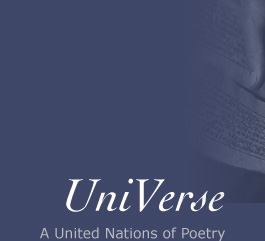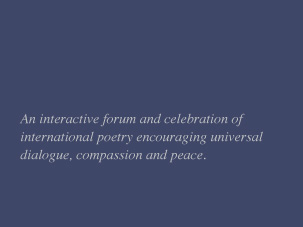| |
 |
 |
 |
 Marko Vešović Poet, fiction writer, essayist, and translator Marko Vešović, born in Montenegro in 1945, teaches literature at the University of Sarajevo. The Bosnian war and the Serb siege of Sarajevo have given an impetus and a new focus to his writing, and many of his poems and prose pieces come out of that experience. His voice, unique in contemporary Bosnian literature, rings with pathos, anger, irony, and sarcasm as he records variations of that war experience, personal and collective at the same time. Vešović’s Polish Cavalry (2002; second, amended edition, 2004), whose title is inspired by the story about Polish cavalrymen charging at German tanks in World War II—a metaphor for the defense of Sarajevo—is a collection of poems and short prose texts put together, as he says, from the sentences he had actually heard, from those he read in the papers and books, and those that came from his own head. Vešović’s latest book of poetry is entitled Parting with Arenzano (2007). Vešović insists that his language is Montenegrin, Bosnian, Croatian, and Serbian, in whichever order. Marko Vešović Poet, fiction writer, essayist, and translator Marko Vešović, born in Montenegro in 1945, teaches literature at the University of Sarajevo. The Bosnian war and the Serb siege of Sarajevo have given an impetus and a new focus to his writing, and many of his poems and prose pieces come out of that experience. His voice, unique in contemporary Bosnian literature, rings with pathos, anger, irony, and sarcasm as he records variations of that war experience, personal and collective at the same time. Vešović’s Polish Cavalry (2002; second, amended edition, 2004), whose title is inspired by the story about Polish cavalrymen charging at German tanks in World War II—a metaphor for the defense of Sarajevo—is a collection of poems and short prose texts put together, as he says, from the sentences he had actually heard, from those he read in the papers and books, and those that came from his own head. Vešović’s latest book of poetry is entitled Parting with Arenzano (2007). Vešović insists that his language is Montenegrin, Bosnian, Croatian, and Serbian, in whichever order.
Bosnia: A Cultural Profile
For most of its history, Bosnia and Herzegovina (Bosnia, for short) has been a land rather than a country. For two or three centuries during the Middle Ages, it was an independent kingdom; then, after 1463, came the long centuries of Turkish rule, followed by the Austro-Hungarian occupation in 1878. Between 1918 and 1992, Bosnia was part of the federal state of Yugoslavia. The collapse of the socialism in Eastern Europe and a grave internal economic and political crisis contributed to the break-up of the federation, once held strongly together by fear, fervor, and the personality of Josip Broz “Tito,” who led the Socialist Federal Republic of Yugoslavia from 1945 until his death in 1980. Bosnia declared its independence in 1992, in the wake of Yugoslavia’s disintegration and amid a series of wars, the bloodiest of which took place on its own territory (1992-1995). The fledgling country, its status still questioned by many, remains under the international community’s supervision.
Situated deep in a mountainous and wooded region of the Western Balkans, Bosnia absorbed various traditions and faiths (Byzantine, Catholic, Islamic, and Jewish) and modified them somewhat in the process. Bosnia’s population reflects all these influences, and its three major nations, shaped in the nineteenth century—Muslim Bosniaks, Orthodox Christian Serbs, and Catholic Croats—created a functional, diverse community, one with a singular cultural aroma in the Balkans. In spite of instances of intolerance, xenophobia, and violence, through most of Bosnian history there has existed in people an inborn sense of the other, a respect for the otherness of one's neighbors, for the other's religion, customs, and material culture. On the level of everyday, ordinary life, Bosnians have always taken these differences for granted, like air or water, and a rich network of human ties—through friendships, mixed marriages, kinship, professional, business, and other connections—have made Bosnia a viable society.
This process of convivencia was recently brutally arrested by political propaganda, rising nationalism, war, destruction, and ethnic cleansing. There were 200,000 people killed in the war, mostly Bosniaks. These events were not inevitable; they only proved that, as the Bosnian author Dževad Karahasan wrote, “fine, complex structures are very weak when confronted with mechanical force. With a hammer you can smash a mosaic—with a mosaic you cannot smash a hammer.” It is clear that the mosaic of Bosnia cannot strike back. It is unclear if that mosaic can be re-assembled in some way in the future. —by
Omer Hadžiselimović
Teach this Poet:
Signature
|
 |
 |
Bosnian/Croatian/Serbian version
Besmrtan Tren
Na prijelazu uličnom dejstvuje snajperist.
Dvije djevojke, zadihane od pretrčavanja.
Iz njih bije vrelina, mirisna, kao iz rublja
svilenog, koje se pegla. U jedne nije frizura
već naježeno božićno žito. Praska, bjesni i psuje
snajperiste: pričinja mi se da kroz prozor
krasnu oluju gledam!
U druge, riječi prijatne
ko lepet suncobrana, izjutra, na plaži budvanskoj.
Trzajem, povremeno, zabaci kosu. Zbog nas!
Jer zna: kad god je zabaci, duga će kosa da zamiriše.
Ljepotica. Ali od onih koje nikad ne propuste
da ti se nasmiješe. I raskošno i škrto.
Dovoljno raskošno da bi te usrećile. Dovoljno škrto
da njih ne košta ništa. Smiješak njihov ti javlja
da za njih nisi stvar među stvarima.
Možda čak da bi htjele sa tebe skinuti čini
ako te leden pogled ženski već u stvar pretvorio.
U zraku snažno zamirisa na moju davnu mladost
kad je svaka aleja vodila do na kraj svijeta.
Kad je duša umjela, čak i u pustinji,
raspjevati se ko žetelica.
Kad život još ne bješe otrcan ko poslovica.
Odoše, čavrljajući, a u meni ostavile su nježnost
kakva te obuzme kad dugo gledaš nebesa
u kojima se snježne pahulje roje.
Odoše. Ne dvije djevojke,
već dva vjetrića, pirnula iznenadno
kroz žegu opsade.
Ilinsku žegu postojanja.
English version
A Deathless Moment
A sniper is working a street crossing.
Two girls, breathless from running across.
They radiate heat, perfumed, like silk
underwear being ironed. One of them doesn't have a hairdo,
but bristling wheat sprouts on her head. She's fuming, thundering,
and cursing at the sniper: I seem to be watching, like out of a window,
a glorious storm! The other's words are pleasant
like the fluttering of an umbrella, in the morning, at the Budva beach.
She tosses her head from time to time. For our sake!
For she knows: with each toss, her long hair will smell sweetly.
A beauty. But one of those who never
fail to smile at you. Both lavishly and stingily.
Lavishly enough to make you happy. Stingily enough
that it costs them nothing. Their smile
lets you know that for them you are not a thing among things.
They wish perhaps to break the spell put on you
by an icy female look that has turned you into a thing.
The air smelled sweetly of my youth of long ago
when every tree-lined lane led to the end of the world.
When life was not yet worn thin like a proverb.
They left, leaving in me the tenderness
that comes over you when you look long at the skies
swarming with snowflakes.
They went, chattering—not two girls, but two breezes, blowing suddenly
through scorching heat of the siege. Through the dog days of existence. |
 |
 |
Bosnian/Croatian/Serbian version
Svitanje
Stojim na straži. U osvit. U blizini je kuća.
Zapravo, žućkasta straćara. Pokraj nje jablan
nad bunarom. Jablan je visok, zbog nečeg
čini mi se, koliko je i bunar dubok.
Ponad kuće se, kao nad Itakom, odmotava
bijeli dim što sliči povoju djetinjemu.
U kući plače dijete. Dugo. Već godinama.
Čini se: čatrlja bi se srušila ako bi dijete umuklo.
Na straži, znade svašta čovjeku naumpasti.
Najednom, iz kuće izlazi curetak zlatoglavi,
desetak, najviše dvanaest godina. Bez noge.
Predivni invalid. Anđelak na štakama.
A na licu joj rumen. Kao od svitanja. I meni
krenu suze. Od rumeni na njenom licu.
Od tog osvita na štakama! Na straži, čovjeka
zna svašta obuzeti.
A dječji plač se ne gasi. Kao da ima
elektromotor svoj zaseban. Plač koji, čini mi se,
ne misli stati sve dok je svijeta. Dok ima žive
duše pod ovim nebesima. Plač koji će se
kroza sve vječnosti oriti.
Jer vrijeme, na straži, bude sporo kao glečer.
Na straži duša, nekad, sluša topot tatara
što nose vijest da, ispod ovog neba,
ničega nema. Pa čak ni tebe. Na straži.
Ima jedino dima. Ne onog nad Itakom.
Već onog iz rečenice, pisane na etrurskom –
prve koju je nauci uspjelo da dešifruje:
Čovjek je samo dim.
English version
Daybreak
I'm doing sentry duty. At dawn. Nearby is a house. Actually,
a yellowish hovel. Beside it--a poplar above a well.
The poplar is as tall, it somehow seems to me, as
the well is deep. Above the house white smoke is unfolding
Like a baby's diapers.
In the house a child is crying. Long. For years already.
It seems: The shack would come down if the child fell silent.
Anything can come to mind when one is
Doing sentry duty.
All of a sudden, a goldenheaded girl comes out of the house,
She's about ten years old—twelve, at the most.
Missing a leg. A gorgeous invalid. An angel on crutches.
With a ruddy face, as if from the daybreak.
And tears welled up in my eyes. From that ruddiness on her face.
From that daybreak on crutches! All kinds of things
can cross your mind
When you are doing sentry duty.
And the child's weeping seems never to stop. As if it had
its own electric motor. The weeping which, it seems,
will not cease, as long as this world exists. As long as there is
a soul alive under these skies. A weeping that will
resound through all eternities. For time, when you are a sentry,
moves slowly like a glacier.
When you are a sentry, your soul sometimes
hears galloping messengers bringing the news that for a long time,
under these skies, there's nothing. Not even you. On sentry duty.
There is only smoke. Not the smoke above Ithaca.
But that from the sentence, written in Etrurian—
The first that scholarship could decipher:
Man is only smoke.
|
 |
 |
Bosnian/Croatian/Serbian
Potpis
Nešto se promijenilo između mene i ljudi
otkad sam jednome od njih roditelj.
Pol Klodel
Trčim s kćerkicom kući –
granate su nas, opet, iznenadile na ulici.
Granate, već stoljećima, svaki dan padaju,
i svaki put iznenade.
Požurujem je ljutitom galamom:
srdžbu s tobdžija srpskih
prenosim na dijete čekano deset godina.
Da se potpišem, veli mi, dok prolazimo
kraj plohe snijega, netaknutog, u parku.
Umjesto da je izgrdim,
dopustih – ko zna zašto – da njezin kažiprst
tu nježnu bjelinu načne,
a potom oko ćirilične IVANE VEŠOVIĆ
moj kažiprst je kružnicu opisao
neprobojnu
kao u bajkama
English version
Signature
Something has changed between me and people since
I became a parent to one of them.
Paul Claudel
I'm running home with my little daughter –
again, shells have surprised us on the street.
Shells have, for centuries, been falling every day,
and every time they surprise us.
I'm hurrying her on with angry words:
transferring my rage from the Serb gunners
to a child awaited ten years.
Let me write my name, she tells me, as we pass
a patch of virgin snow in the park.
Instead of scolding her,
I—God knows why—let her forefinger
break the delicate whiteness,
and then, around the Cyrillic IVANA VEŠOVIC
my forefinger describes a circle,
impenetrable.
Like in fairy-tales.
Teach this Poem
This poem captures a moment from the poet’s life in the besieged Sarajevo. From 1992 to 1995, the city was constantly shelled by Serb nationalist forces perched on the
surrounding mountains. Thousands of people, mostly civilians, including many children, were killed.
- What kind of meaning does Vešović create when, at the beginning of the poem, he says that “Shells have, for centuries, been falling every day”?
What figure of speech (one expressing exaggeration) does he use here? What does such exaggeration do for the tone of the poem? What does the line “And every
time they surprise us” suggest?
- Do you think the father's anger, transferred to his daughter, is actually an expression of love and worry for her? Why does Vešović tell us that she
is “a child awaited for ten years”?
- Why do you think that Ivana wants to sign her name, even though it’s dangerous for them to remain on the street, exposed to mortar shells and bullets?
- Cyrillic is one of the two alphabets used by the Bosnian/Croatian/Serbian language and is preferred by Serbs, while Bosniaks and Croats use the Latin alphabet. Long
before the war in Bosnia, however, Cyrillic had been losing ground to the Latin alphabet due to Western linguistic and cultural influences. Why do you think Ivana signs her
name in the Cyrillic alphabet? How does this choice contribute to the poem’s tone, and to that last reference to “fairy tales”?
- Why do you think the poet-father likens this moment to something from fairy-tales? Does this seem like a fairy tale to you?
- This poem seems to describe a brief, very real scene, but by immortalizing this scene in a poem, Vešović has enclosed it in the circle of metaphor. What
may the snow symbolize? The circle?
- Write an interpretation of this poem with these questions in mind (Remember—there are many symbolic echoes in a strong poem and no one “right”
answer! The important thing is to read the poem closely several times, trust your instincts and find evidence for your interpretation in the text).
- Using this poem as a model, write your own poem that tightly encloses a moment. Your perspective in this poem should be “zoomed in,” closely cropped around
a single scene. Try to include all five senses in your description and avoid editorializing—stick to straight description. Use one of these prompts for your
freewrite draft:
- Recall a scene involving you and your dad.
- Recall a moment shared with an older relative.
- Describe a scene spent with a child in which the child did something to surprise you.
- Describe a scene in which you yelled at someone, or “transferred your anger” to someone who did not deserve it. What did you say? What did
the other person say? (Feel free to include one or two of these utterances in the final poem.)
- Describe a scene when you were in danger but didn’t realize until later that you were at risk.
- Write a scene with snow in it.
- Write a scene that includes your own name.
- Describe a moment that is simple and ordinary and imagine that it takes place in the middle of a war.
Now polish your freewrite into a poem. The poem should be at least 12 lines long and no more than 18 lines. The poem should be in free verse. It should not rhyme, but
should be written in sentences that are either end-stopped or enjambed down the page.
- Take a walk in silence, then do a freewrite describing your sensations, memories, the scenes you saw and the voices you heard while walking. Revise this
freewrite into a poem.
- “Signature” begins with an epigraph, a quotation from another source. Find a quote that means something to you, then write a poem that
illustrates the truth of that epigraph. Note that to illustrate ideas in a human poem is very different than to expound on them.
Write a poem describing a walk. Read some walking poems for guidance.
Related Reading
- Walking Poems:
“Grandfather Poem”, by Mandy Smoker
“Quarantine”, by Eavan Boland (note that this is an especially sad poem)
“Walking to my Uncle’s Funeral”, by Inara Cedrins
- For more poems about the war in Bosnia, read the poems of Mario Susko. Read Mario Susko’s “Life,” and discuss the
relationships between children and their parents and grandparents in these poems.
“Life” is a remembered poem told from the point-of-view of a child, while “Signature” is told from the father’s point-of-view. You may
write your own poem from your present point-of-view, or in a remembered point-of-view. How do such choices change the poem?
- “Signature” could be understood, in part, as an “ars poetica,” a poem about writing. For another poem about writing, and the fairy tale
aspect of the imagination, read Meena Alexander’s “Muse”.
- For a poem describing a single, unforgettable moment highlighted during a time of war, read “We Never Know” by Yusef Komunyakaa.
|
|
 |
 |
Bosnian/Croatian/Serbian version
Tin Ujević u Opkoljenom Sarajevu
Moja osmoipogodišnja
Kćer
Jede pile,
Prvo nakon
Godinu i po dana,
I kaže s uzdahom dubokim:
Umrijeću od ljepote.
English version
Tin Ujević in Surrounded Sarajevo
My eight-and-a-half-year old
Daughter
Is eating chicken,
For the first time after
A year and a half,
And says with a deep sigh:
I'll die in beauty!
|
 |
 |
Bosnian/Croatian/Serbian version
I Ja Sam Ko Knez Andreja
s ledine zelene, ranjen, gledao u vječna nebesa.
Milion milja uokolo ničega nije bilo.
Jest, milja, kao da je praznina grdna
što je hučala oko mene, u stvari, bila pučina.
Gola i nedogledna. Od svega, ispod neba,
ostala slijepa golotinja koja neljudski huči.
Isprva su, doduše, srpske se žabe čule
po dobrinjskim barama. No brzo su zamukle.
Ja, čudnoga li čuda: hor žablji ispraća me
na onaj svijet (mislio sam, ako se to i moglo
mišljenjem nazvati. Jer mislila je koža).
I ja sam, ko knez Andreja, pred smrt,
odjednom, osjetio da ničeg na svijetu
i nema, osim one daljine neizmjerne,
nada mnom, i daljine, još bezmjernije,
unutra. Kao da je duša gledala sebe
odnekud iz beskraja, silno ljekovitoga.
Il ko da bol svoj gleda nakon milion ljeta.
Bol stvoren u slap bijel,
što huči ko vrelo Bosne.
I ja sam, ko knez Andreja, shvatio
da ničeg važnijega
nema od tih daljina što su se množile munjevito.
Sedamdeset i sedam nedogleda,
sa svakog duša pije
kao sa sedamdeset i sedam kladenaca
iz moga zavičaja.
Svijet je, uokolo, bio u prah samljeven,
bio je nalik onom
rumenom stubu prašine što sukne u visinu
granata kad pogodi nečiju kuću u Sarajevu.
I ja sam razumio da tolike daljine mogu
izići samo na dobro. I raduješ se
što u tim daljinama,
trunka si ovolišna,
ali trunka u koju sve te daljine staju.
I ja sam osjetio kako se, te daljine,
odjednom sručuju u me,
ko Krkin slap kod Knina,
al veći milion puta. Sa milionima duga
koje se prave u vodenoj prašini.
I ja sam slušao kako se, te daljine,
sručuju da me iznutra
očiste, da operu ljage krvi u koje,
cijeli svijet bijaše rastvoren.
English version
I, Too, Like Prince Andrey
From a green meadow, wounded, was staring at the sky.
There was nothing for a million miles around.
Yes, miles, as if the immense void that
Roared around me was in fact the open sea.
Stark and boundless. From everything, under the sky,
Only a blind starkness remained that roared brutally.
At first, to be sure, Serb frogs could be heard
In Dobrinja's ponds. But they soon fell silent.
Oh, wonder of wonders: a chorus of frogs is bidding me farewell
To the other world (I thought, if that could be
Called thinking. For it was my skin that was thinking).
I, too, like Prince Andrey, before death,
suddenly felt that there was nothing
In the world but that immeasurable distance
Above me, and the still more immeasurable distance,
Inside. As if the soul was looking upon itself
From an immensity
powerfully healing.
Or as if it were looking on its pain after a million summers.
Pain turned into a white waterfall roaring like the spring of the Bosna.
I, too, like Prince Andrey, realized
that nothing matters more
than those distances that multiplied with lightning speed.
Seventy-seven immensities, the soul
drinking from each like from the seventy-seven fountains of home,
The world was, all around, ground to powder,
and looked like that
Ruddy column of dust that surges upward
When a shell smashes into someone's house in Sarajevo.
And I understood that those many distances
Can only come to the good.
And you are happy because, in those distances, you are a tiny wisp,
But a wisp containing all those distances.
And I felt they, those distances, were
Suddenly pouring into me, like Krka Falls near Knin,
But a million times bigger. With a million rainbows
Created in watery dust.
And I listened to those distances rushing to
Cleanse me from the inside, to wash the blood stains in which
The whole world had been dissolved. |
 |
 |
|
 |
|





